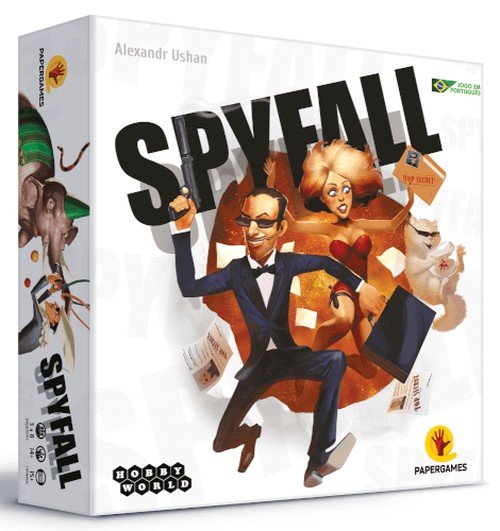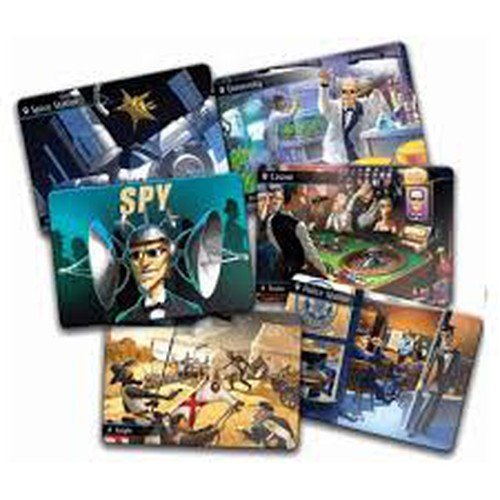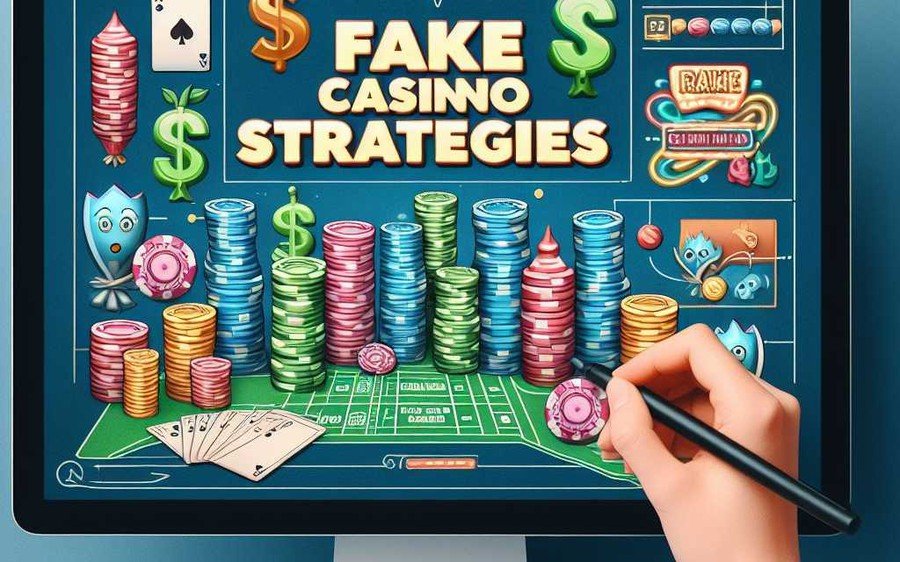Secret Agents and Spies
Who hasn't at least once dreamed of being a secret agent or a spy undercover, bluffing and deceiving everyone? You can experience this emotion in Spyfall - but, before, let's see some interesting trivia on what these fictional secret agents and spies actually do!
The "secret agent" role has dominated the big screen for a long time and peaked with James Bond, the iconic "007" that works for the MI6 (Military Intelligence, Section 6). By the way, in real life it's actually called the Secret Intelligence Service, the SIS, and was previously the Secret Service Bureau, but these types of government organizations have existed for centuries…

Oh, and for the younger audience, an excellent secret agent is Ethan Hunt, played by Tom Cruise in the Mission Impossible franchise. In this case, he was an IMF (Impossible Missions Force) agent. Only a character played by Tom Cruise could tackle these types of missions!

Anyway, let's delve a little deeper into these agents! Both James Bond and Ethan Hunt worked as spies because that used to be part of what secret agents did as well. The art of spying has existed for maybe a millennium. Sun Tzu, in his book, The Art of War, already discussed spying as an intelligence service to get secret information and thus get ahead of your opponents.

Spying, or investigating, in its essence, demands a lot of wit and cleverness. A famous example from books and movies (and even board games), is Sherlock Holmes, who worked for the Scotland Yard. He is known for his techniques; a mixture of the scientific method and deductive logic that is always accurate.

Well, Spyfall has all of this! You'll feel like James Bond or Ethan Hunt, and use Sherlock Holmes' sleuthing techniques to get a win. Are you ready for all of this?
Game Info
Spyfall is played with 3 to 8 players, its age recommendation is 12 years and up, and was created by designer Alexandr Ushan. Its artwork was created by Sergey Dulin and Uildrim. Spyfall was released in 2014 by Hobby World*; it was released in Brazil by Paper Games. Its mechanics are bluffing, deduction, secret placements, clues, gambling, and voting.

I'll stress that Spyfall works independently of its language, which is really great. It is the perfect game to have fun and laugh with your friends, as it combines humor and an investigative theme with "good guys and bad guys".
The Game
Basically, "good guys" are secret agents, and the spy is the "bad guy". The greatest rule is: no one knows who anyone is.

All agents go to a location and play, in this location, a certain part - after all, they're undercover. The spy needs to collect information and figure out where agents are, but, at the same time, keep their own identity a secret. But where's the fun?
Imagine the following scene: agents are talking to each other on a radio frequency, the spy found this frequency and is intercepting the conversation. The agents can tell there's someone weird between them, but they don't know who the spy is. The agents have to guess who is the spy correctly before they figure out where they are.
The strategy the agents will use to figure out who the spy is will be asking random questions that refer to where they are but without telling them exactly where they are, and see how people respond. If the answer is reasonable, okay, they might be a secret agent too. But if they hesitate, or reply with some nonsense, they might be the spy.
The gist is asking the right questions but without giving too much away to hide where you are. Let's see how this all works in practice.
Spyfall has 30 different locations. Each location has either secret agent or spy cards. Secret agent cards already come with the name of the place they are and what their disguise is - usually a part they have to play in that location. The spy card only says "spy", and has nothing to indicate where the secret agents might be.

But how does that happen? Who defines who will be the spy, and who will be secret agents? Simple! In each location deck, there are enough cards for 7 players to act as secret agents and 1 card for the spy. When you set up your board, for instance, for 6 players, get 5 secret agent cards and 1 spy, then shuffle them (their covers are identical) and give one to each player. Now everyone will have a part to play: either secret agent or spy.
Note: Obviously, as there are 30 locations, the game states that everyone should look at this list of locations beforehand so they memorize it and avoid looking at it too often as this will reveal you're the spy.
Now the game will actually start. The person who dealt the cards will ask the first question to anyone on the table, and then this person will ask another person (so they can't ask the first person who already asked), and so on and so forth. Eventually, one of the secret agents will find out who the spy is (or at least suspect it), or the spy will figure out where the secret agents are.
It seems a bit too easy and boring, isn't it? Well, this is when it gets harder. Before the first player asks their question, you have to set a countdown for 8 minutes. This means you have to figure out either where the secret agents are or who is the spy in just 8 minutes. It is like a ticking time bomb!
And that's not all: a lot can happen in 8 minutes. The secret agents may stop the game and vote if they suspect a player in particular is the spy, and the spy might also reveal themselves and try to guess where they are. Everything has a consequence - if you do something wrong, the other side wins. It is crazy, and so exciting, everyone will laugh and have fun.
Oh, not to mention, you can't simply just point at someone. The player that asks to guess who the spy is has to say the name of the person they suspect and call a vote, which must be unanimous. If it isn't unanimous, the game goes on, and this all happens as the clock ticks on.
What if we run out of time? Simple, voting is mandatory. The player who dealt the cards should start the vote, and everyone must vote. If the secret agents guess correctly who the spy is, they win, but if they get it wrong, nothing happens.
This is a Spyfall round!
End Game and Score
Before the game starts, all players must decide how many rounds they'll play, so how many locations, out of all 30, they'll play. Once they run out of locations, that's when the game ends.
You add up your score in the following way:
Once all rounds are finished, whoever scored the most points wins!
Tips for Strategy
Here are a few tips for you from someone who played a lot of Spyfall if you want to take your Spyfall strategies to the next level. I'll separate these tips into secret agent tips and spy tips. Let's go!
Keep in mind that secret agents have 2 goals at the same time:
With this in mind, secret agents must avoid being too explicit when they ask their question. Let me explain. Imagine that the location is a bank: you can't ask someone "how much did the thieves steal?" because it would be obvious to guess that you are at the bank. The spy would simply guess correctly.
I suggest more generic questions, like, for instance, for the bank: "which time did we close yesterday?" because it is easier to figure out who the spy is with a schedule question like this. As spies don't know where you are, they'll probably say something generic like "6'o clock" (and banks usually close earlier than that).
If you are a secret agent, someone asks you a question, and you share too many details, it may make it easier for the spy to collect data and guess the place. But if you're too vague, it may seem like you're the spy. There is a fine line between answering the question as best you can without giving away where you are. It's a great balance!
Secret agents must also pay attention to both questions and answers. If they're too vague, that's a sign they might be the spy. Suspect everything and everyone! Use your wits, deduction skills, and best strategies!
On the other side, the spy also has two goals at the same time:
So, the best tip I can give you is: listen closely to what other players say and try to piece together where they are from that. At the same time, when you ask questions, avoid generic questions, and try to ask questions that relate to other questions so you can pretend you know where you are.
In these situations, being confident when you answer makes all the difference in the world. Put on your best "poker face" and speak like you know exactly where they are, even though, obviously, that's not true at all!
Waiting until the 8 minutes are up is a big risk because the secret agents will vote anyway, and they might end up getting it right. This is a risk that you, as a spy, must consider, but it is still a valid strategy. Be smart, and always bluff!
That being said, enjoy this "cat and mouse" adventure, use your best strategies, your deductive skills, and wits, and win!
This is Spyfall!
Unboxing, Rules, and Gameplay Videos
Check out this unboxing:
Check out the rules:
Check out some gameplay:
Teaching Tips
Spyfall relies heavily on collecting information, that is, you'll have to pay attention at all times. It's more than just listening: you'll have to "connect the dots" between one answer and another, and that really forces our brain to decode messages and gather information to get to a solution.
To work with the information you collect, you'll have to put your memory to work. It's not enough to just get information, you'll have to memorize it so you don't ask it again, and, as a result, lose precious minutes (keep in mind you only have 8 minutes). Working on your memory skills is great for people of all ages.
Your ability to focus will also come into play. This is an excellent opportunity to keep people "focused" and paying attention to every detail. You'll likely win the game if you pay attention to every single detail, so keep your focus at all costs!
The clock counting down will also encourage you to think fast, which is great because it will make you work harder, and thus it's a better workout for your brain.
You'll still use a lot of strategy - asking the right question or giving the right answer is crucial in Spyfall!
The best Spyfall will teach you is: keep focused, pay attention, use your memory, deduction skills, lots of strategy and wit! You'll need all of those if you want to be precise when you have to express yourself, and guess correctly who the spy is (if you're an agent), or where the agents are (if you're the spy).
Spyfall is a great workout for the brain!
I highly recommend you add Spyfall to your collection!!














— Комментарии 0
, Реакции 1
Прокомментируйте первым